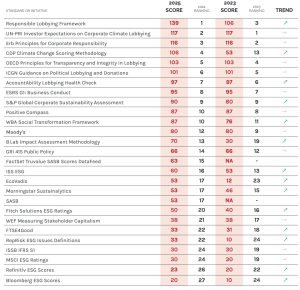ESG data and ratings providers and other initiatives are overly focused on direct lobbying, with full spectrum of practices slipping under the radar.
Investor efforts to tackle corporate advocacy activities are getting limited help from tracking solutions, according to non-profit The Good Lobby.
The Good Lobby Tracker scores ESG data and ratings providers, sustainability reporting standards, and other initiatives on their ability to effectively assess and report on corporate political activities.
Its recently released 2025 report acknowledged that “progress is slow, but momentum is building” since the previous 2023 edition. The new tracker also highlighted the “persistence of major gaps across all initiatives”, as well as “significant” variation in how frameworks assess companies lobbying practices and methodologies used by different data aggregators.
This leaves investors lacking “critical” information and data on lobbying when making investment decisions, the report stated. “As a result, they may invest in companies whose political influence contradicts their public stance in terms of ESG goals, with significant reputational and financial repercussions,” Alberto Alemanno, Founder of The Good Lobby, told ESG Investor.
Tracking corporate advocacy activities is a pervasive problem for investors, with several hurdles hindering the pursuit of accountability and transparency. It is also a growing priority, with evidence of increasing efforts to dilute or delay sustainability-related policy initiatives. Lobbying made its presence strongly felt in Q4 2024 alone, influencing negotiations over the Global Plastics Treaty, COP29, COP16, and climate policy more widely.
This month, investor concerns have been piqued over the potential impact of Paul Atkins’ nomination to lead Securities and Exchange Commission on attempts to scrutinise corporate lobbying through shareholder proposals.
Alemanno said that the tracker is used as a reference by dozens of institutional investors, including the Church of England Pensions Board (CoEPB) and Norges Bank Investment Management.
“Institutional investors have a direct stake in understanding how corporate political activities shape market outcomes, policy landscapes, and long-term risks,” he added. “Given the sensitivity of institutional investors to risks that could impact the standing of companies they invest in, and that political activities can have reputational risks, the tracker can be a useful tool for institutional investors.”
Asset owners have taken matters into their own hands developing the Global Standard on Corporate Climate Lobbying. Instigated by AP7, BNP Paribas Asset Management and the CoEPB, and supported by Chronos Sustainability, the standard aims to encourage investors and companies to adopt responsible climate lobbying practices.
The Good Lobby described the standard as “useful”, but it is not covered by the tracker due to its focus on a single issue in climate.
Narrow focus
Alemanno started the Good Lobby Tracker project in 2020, and has regularly updated the tool to reflect changes in standards and corporate practices, as well as new regulations and evolving investor expectations.
The tracker ranks 27 services, standards or initiatives across eight categories; responses to 30 weighted questions gives a score out of 200. While every standard and initiative in the tracker stayed the same or improved from their 2023 scores, just six scored more than 100 out of 200. Only one – the Responsible Lobbying Framework – surpassed 118 (see chart below).
According to the tool, ESG data and ratings firms, including Bloomberg, FTSE Russell, Morningstar Sustainalytics, and MSCI, measure at most a quarter of most companies’ lobbying practices. No provider scored more than 100, with S&P Global Corporate Sustainability Assessment scoring the highest at 90.
Bloomberg ESG Scores received a score of 20, the lowest rating in the tracker, with Refinitiv ESG Scores narrowly ahead with 23.
The report also highlighted that most of the methodologies and assessment frameworks included in the tracker focus narrowly on direct lobbying, but “fail to account for other significant ways that companies shape policy and public opinion”.
This includes indirect lobbying, whereby lobbyists look to influence policymakers and use public opinion to push particular policy objectives. This can be done by using social media, trade associations, industry alliances and coalitions, and is a way to avoid investor scrutiny.
“One of the biggest surprises is how little data is available and how many corporate political activities – from indirect lobbying done by trade associations to that performed by think tanks and academic institutions – continue to be neglected by these initiatives, especially given that it is critical in evaluating companies’ sincerity about environmental and social commitments,” said Alemanno.
“While some initiatives have made strides in refining their methodologies, many continue to focus narrowly on direct lobbying, overlooking significant indirect activities such as issue advertising, trade association memberships, and sponsored research.”
Reflecting the importance of indirect lobbying, the non-profit is also developing REBASE, a research and policy project that seeks to identify and highlight good practices in how business and trade associations ensure their own responsible political conduct and govern themselves transparently.
The Good Lobby said it will continue to engage with the publishers of standards and methodologies assessed in the latest edition of the report, aiming to increase the quality and quantity of the data points they gather.
“The initiatives can improve in two main ways,” said Alemanno. “Firstly, by improving the methodologies themselves by incorporating more of the best practices recommended in the tracker, for instance by addressing third-party influence and broadening the focus beyond climate change.
“Secondly, by making their methodologies more transparent. Transparency is critical for credibility and user confidence,” he added. “Initiatives should make their methodologies fully accessible to stakeholders, detailing how they gather, assess, and score data.”

Source: The Good Lobby Tracker
The post Lobbying Tools Shed Little Light on a Murky World appeared first on ESG Investor.














